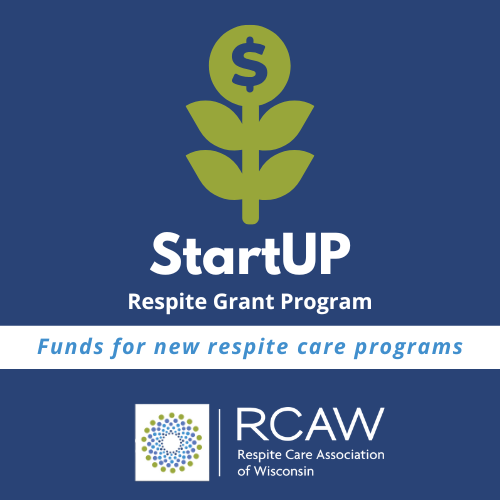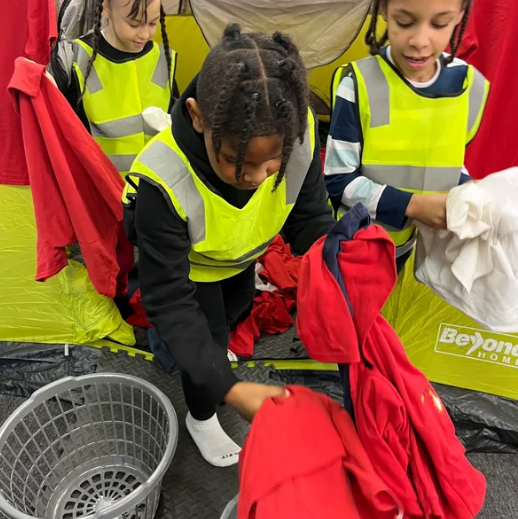Before applying for the StartUP Respite Grant Program, applicants must complete RCAW’s Bringing Respite to Your Community (BRYC) Workshop.

One of the most significant barriers to starting a new respite program is the start-up business costs, such as facility costs, insurance, payroll, accounting, licensing, equipment, supplies, and staff education.
Respite Care Association of Wisconsin (RCAW) is looking to fund new respite programs or business or existing programs or locations as part of an existing business looking to expand respite care hours in Wisconsin.
Thanks to funding from the Administration for Community Living (ACL) through the Federal Lifespan Respite Grant program and a partnership with the Wisconsin Department of Health Services, RCAW will provide these funds to all 72 counties and 11 tribes in Wisconsin through July 2027.
This highly competitive grant opportunity attracts numerous applicants striving to bring innovative respite care solutions to their communities.
ELIGIBILITY
To qualify, applicants must meet one of the following criteria:
- Establish a new respite program or business, or
- Expand an existing business by adding a new respite program or location.
Additionally:
- The program or business must provide direct respite care services in Wisconsin.
- At least one key team member must have completed the Bringing Respite to Your Community (BRYC) Workshop.
IMPORTANT DATES
Applications will be accepted throughout the year. Award decisions will be made quarterly (see chart below). Programs may submit up to two applications per year. Programs that have not previously been selected will be given priority.
The StartUP is an ongoing grant through 2027.
Note the dates below are the same for the years 2022-2027.
| Applications Due | Decision to Grantees | Grant Funds Mailed | |
| Quarter 1 | December 15 | December 29 | February 5 |
| Quarter 2 | March 15 | March 31 | May 5 |
| Quarter 3 | June 15 | June 30 | August 5 |
| Quarter 4 | September 15 | September 30 | November 5 |
Questions can be directed to [email protected].
This can be YOU!
 Natesha Kelly of Milwaukee is a past participant of the Bringing Respite to Your Community (BRYC) Workshop and awardee of a StartUp Grant.
Natesha Kelly of Milwaukee is a past participant of the Bringing Respite to Your Community (BRYC) Workshop and awardee of a StartUp Grant.
Recently, Natesha opened a licensed adult family home, Trusted Care LLC, in Milwaukee. Congratulations, Netesha! Thank you for providing invaluable respite services to those in your community!
 Urban Angels Traveling Play Care is another proud RCAW StartUP Grant recipient. They offer a “groundbreaking service that fosters a win-win social experience for caregivers and their children during special events and community activities. This initiative aims not only to support caregivers but also to nurture the growth and development of children in a fun and engaging setting.”
Urban Angels Traveling Play Care is another proud RCAW StartUP Grant recipient. They offer a “groundbreaking service that fosters a win-win social experience for caregivers and their children during special events and community activities. This initiative aims not only to support caregivers but also to nurture the growth and development of children in a fun and engaging setting.”
Check out their website here.
How to Apply
Step 1
Download the application questions and templates here:
Step 2
Fill out the online application.
Note: You cannot save and return to your application. In step one, you should type up your answers using the Word document for easy copying and pasting.
Step 3
Email the budget templates and additional supporting documentation to [email protected]
FAQs
| Applications Due | Decision to Grantees | Grant Funds Mailed | |
| Quarter 1 | December 15 | December 29 | February 5 |
| Quarter 2 | March 15 | March 31 | May 5 |
| Quarter 3 | June 15 | June 30 | August 5 |
| Quarter 4 | September 15 | September 30 | November 5 |
Programs may submit up to two applications per year. Programs that provide services to populations and areas of the state that have not been previously served will be given priority.
You can be at any stage of the process! RCAW asks for a program/business name and an Employer Identification Number (EIN) to receive funds. Otherwise, funds are going to you personally rather than the business. This could cause issues for your tax reporting, as it would be considered personal income. If the program is part of an existing organization, then the funds would go to that organization to fund this new program.
Grant requests can range from $5,000 to $25,000. A successful grant applicant might receive partial funding depending on available funds.
Funds can be used for business-related start-up costs:’
- Staff Salaries,
- Facility,
- Insurance,
- Licensing,
- Staff onboarding,
- Education,
- Printing,
- Marketing,
- Program supplies,
- Equipment.
Please note: these funds are funded through a federal grant and cannot be used for food costs.
An independent provider is an individual who is providing respite services for clients independently. They may be listed as a sole proprietor or as an LLC and might have a contract with a county, MCO, or individual clients. Click here to learn more about becoming an independent provider.
A respite program has employees or volunteers that assist in providing respite services. The program could occur as little as once or twice a month, or as often as daily.
No, individuals looking at becoming independent providers are not a good fit for this grant. This grant is specifically to start new respite programs in the community.
Respite programs can be volunteer-based programs or large businesses. There are many ways a respite program can look. Here is a short list of some of the ways.
Faith-based or Volunteer-based respite programs – provides respite with volunteers for no to little charge to families. These programs may run as little as a couple times a year, or as often as weekly.
In-home respite staffing agency – this program hires employees to provide respite in the client’s homes, staff’s home, or the community. This is often one-on-one care between the staff and the client. There is often a contract with a long-term care funding source, MCO, or private pay.
Community-based respite programs – these are programs that take place in a community setting such as an adult day center, a child care center, an adult family home, a community center, a park, or other place outside of the home. Typically more than one individual attends the program at one time, and there is a use of staff or volunteers to support the respite program.
New program – this is a respite program that is brand new. This is the first service that the program or business is providing.
Expansion program – this is a new respite program or location that is part of an existing business (ANY business).
Examples:
- An agency currently provides in-home services and are applying to open a respite center, this is considered an expansion program.
- A child care center wants to start offering respite care, this would be an expansion service.
The RCAW StartUP Grant application needs to focus on the program that you are starting up. The questions need to be answered for the new program. There is one additional question about how the new program fits in with the existing organization. Here you would explain how the programs fit together, why you are expanding, etc. The rest of the application should focus on the program you are asking to be funded. Answer the question about how funds will be used as it relates to the new program. The budgets should be clear on the new program vs the existing organization.
The BRYC workshop is currently offered through RCAW. To find out more about the RCAW workshop visit: Bringing Respite to Your Community Workshop.
Completing the RCAW Respite Care Provider Training (10-course respite training) does not meet the eligibility requirements for this grant.
Congrats! You will receive an agreement and paperwork to sign. Once these are returned, you will be mailed your grant award. There is a required 6-month and 1-year progress report about how the funds were used and how the program is going. Click for guidelines for these reports.
Val Madsen can answer any questions you have. You can email [email protected] or set up a virtual meeting using the meeting scheduler link.
This project was made possible by support from the Administration for Community Living (ACL) and the U.S. Department of Health and Human Services (HHS) as part of a financial assistance award (grant number 90LRLI0050) totaling $2,010,042 with 75% funded by ACL/HHS and $502,968 (25%) funded by non-government source(s). The contents are those of the speakers and do not necessarily represent the official views of, nor an endorsement, by ACL/HHS, or the U.S. Government.
Grant Program Fraud Statement RCAW funds the majority of its programs with state and federal funds. RCAW is responsible for ensuring funds are used for their intended purpose and in a manner to conduct the goals and objectives identified in the grant. RCAW reserves the right to deny a grant application if it suspects or detects fraudulent information contained on a grant application RCAW also reserves the right to report suspected fraud to the appropriate officials, and applicants will be banned from applying for grants in the future. They may be subject to repayment of said grant funds to RCAW. All parties involved in grant fraud can potentially be charged with government grant fraud. Using state and federal grant dollars for unjust enrichment, personal gain, or other than their intended use is a form of theft, subject to criminal prosecution. Read the Grant Program Detailed Fraud Disclaimer.